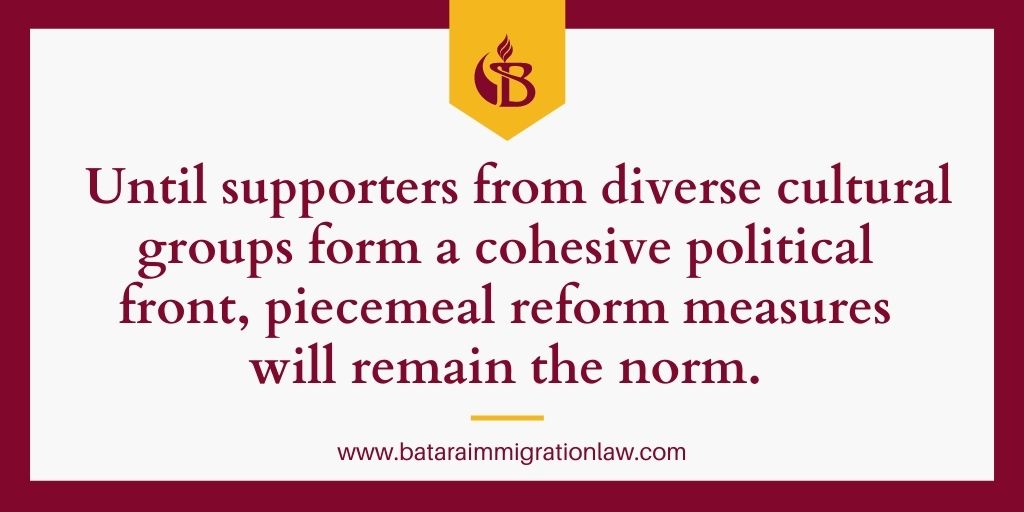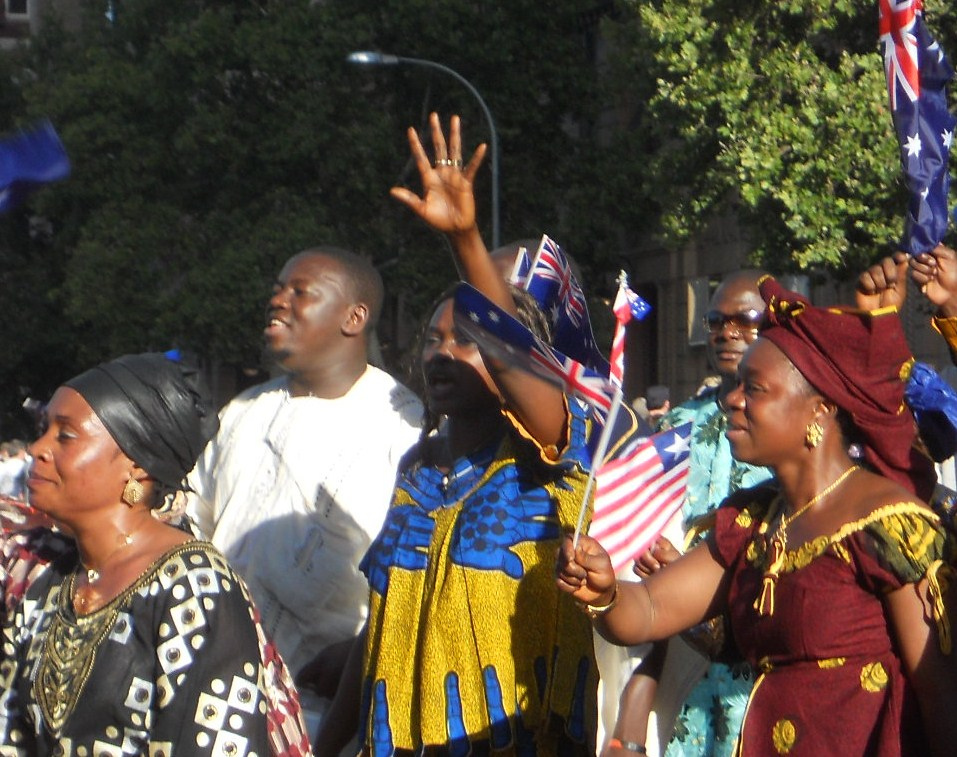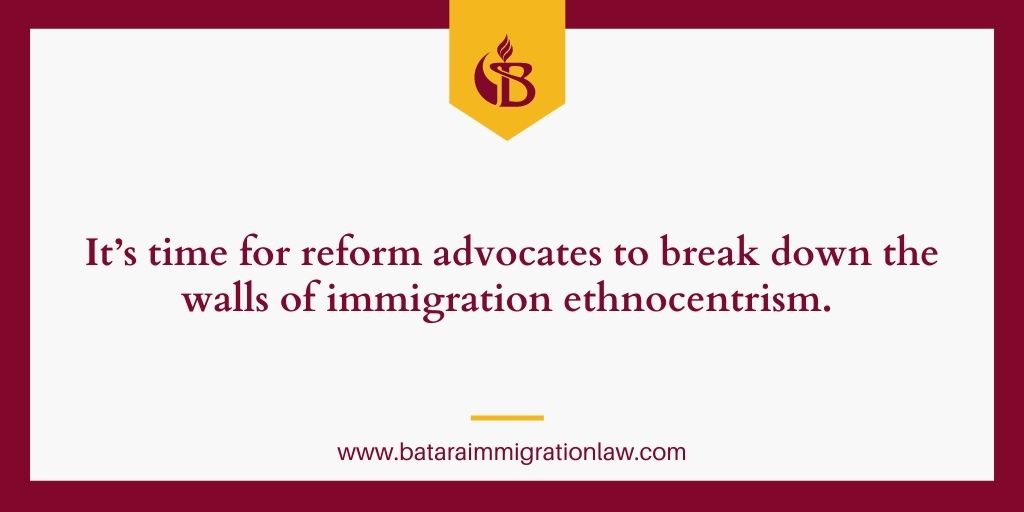
United we stand, divided we fall.
This theme is more than the title of a popular song in the early 1970s. It is a slogan worth adoption by all immigration reform supporters, by all immigrant communities.
For many years, as a family unity attorney, I have denounced the American public for failing to acknowledge the benefits of cultural diversity which immigrants bring to this country.
My criticism does not exclude any ethnic group.
Whereas members of various cultural groups may appreciate the value of immigration reform for their cultural brethren, they largely ignore the same needs for immigrants of different hues, traditions, and origins.
Towards A New Immigrant-Based
Rainbow Coalition
Overcoming this narrow view is critical to developing a political agenda which leads to comprehensive immigration reform.
Yet, given the current tendencies exhibited as part of the immigration reform movement, building a rainbow coalition seems further away from becoming reality at any time since the early 1950s.
The deep-seated animosity of many Americans towards immigrants based on race was openly displayed during the Trump years. Now out of the bottle, the evil genie of racism will not be easily put back in its place.
Equally discouraging, the failure of various immigrant and ethnic communities to lend a helping hand to immigrants from different cultures does not bode well for our country’s future.
Of course, as various studies have shown, it’s natural that ethnic and cultural group members tend to trust others from their own group.
Nonetheless, immigrant advocates, activists, and community leaders must become more diligent in stretching their outreach on immigration issues to encompass different ethnic communities and their concerns.
Otherwise, comprehensive immigration reform will likely remain out of reach.
A Narrow Media And Political Focus
On The Southwest Border
For many years, the failure to move the needle on immigration reform was due, in part, to the media emphasis on Mexican and other Spanish-speaking immigrants, especially from Central America, arriving at the U.S. southwest borders.
Of course, much of the media view has been shaped by opportunistic politicians, who built narrowly-defined campaign messaging geared to heighten public xenophobic tendencies and induce an unreasonable fear of immigrants entering through the nation’s southwest borders.
Besides its false emphasis, the Southwest Border narrative failed to capture the broader picture of immigration reform.
The truth is that Hispanics are not the only immigrant community growing and in need of comprehensive immigration reform – but success requires Hispanic advocates to join with those from other ethnic communities. And other communities to join forces with Hispanics and each other.
For until supporters from diverse cultural groups with a stake in changing our country’s immigration laws coalesce to form a cohesive political front, piecemeal reform measures will remain the norm.

In short, if immigration reform is to take place, it will require a team effort.
It will require immigrant communities to understand and repudiate the divide and conquer tactics of those who want to keep America’s doors locked to persons born abroad.
Without vigilant reflection, cultural pride is transformed into cultural isolation, the opposite of what is needed for immigration reform success.
The Shameful Impact Of Cultural Isolation
Here are a few examples of how cultural isolation affects immigrant communities:
- Back in 2017, when the Trump Administration issued a series of executive orders, known as the “Muslim Ban”, to keep immigrants from various Muslim-majority nations from gaining lawful entry to the United States, the collective outcry from other ethnic communities was relatively miniscule.
- As Afghan immigrants tried to flee their country after a failed 20-year war led by the United States, similar to the ordeal faced by Vietnamese and Cambodian refugees in the 1970s, many immigrant groups were unwilling to support their relocation efforts.
- When the United States government began to deport Cuban refugees back to their home country, several Hispanic advocates from other countries openly cheered the demise of their protected status under the Cuban Adjustment Act.
- More recently, as the Biden Administration has attempted to assist individuals from Ukraine, in the midst of military atrocities against their country, many immigrant advocates have turned a cold shoulder to their pain because of their preferred “white” status.
I am not a fan of the “unfair treatment” arguments. In my view, if one group qualifies for certain benefits – and another does not – the solution is not to tear down good programs for those who qualify. Rather, immigrant advocates should work towards expanding which immigrants are included in those programs. Or creating new ones with similar benefits.
I am not blind to the fact that factors like race and religion have played a huge role in shaping immigration law, often in discriminatory manner.
These laws, however, have not been written by the immigrants. They have been written by policy makers. Why, then, should “lucky” immigrants be stripped of legalization pathways for which they are entitled under such programs?
The “unfair treatment” position, consciously or unconsciously, reinforces the divide and conquer tactics of immigration reform opponents.
Cultural pride and loyalties are utilized to pit one immigrant group versus another immigration group.
Most immigrants who seek entry to the United States act out of necessity. The degree of necessity differs from country to country, from immigrant to immigrant.
Immigration law does not and need not set a threshold of pain and suffering as the litmus test for reform. Immigrants arrive with varying burdens. That alone should be enough for immigrant communites to support each other.
Further, simply because different immigrant groups are entitled to benefits stemming from different programs does not mean immigrants should not support each other’s needs.
On the contrary, it is by immigrants from a variety of backgrounds, with varying needs, helping each other that more inclusive immigration policies will emerge.
A significant portion of this burden falls on the shoulders of immigration advocates. They must model the supportive actions and behaviors for their cultural brethren to emulate.
Unless these spokespersons and community leaders, upon whom new immigrants rely, do their best to grasp and empathize with the hardship of persons from different countries, the odds of achieving comprehensive reform success are slim.
After all, petty policy resentments reflect behaviors of self-centered cultural nationalists of different stripes, not immigration coalition builders.
Such ethnocentric attitudes are not the way to build a true nation of immigrants.
Immigrants In The United States:
Growing But Isolated
In short, the cultural isolation of immigrant communities harms the overall immigration reform movement by keeping political allies separated.
Worse, the xenophobic divide and conquer psychology has a deeper, more sinister yet less noticeable effect within ethnic communities.
Take, for instance, the political predicament of the Black immigrant community.
Nearly every ten years since 1980, the numbers of Black immigrants has doubled. Still, they remain detached from other immigrant communities, as well as from many Black Americans who share similar cultural similarities and common obstances.
According to some population estimates, there are 4.6 million Black immigrants in the United States. This equals about 12% of the nation’s entire Black population.
Moreover, Black immigrants are an educationally successful immigrant group.
They have more college education and higher rates of degree attainment than any other immigrant group in the United States.

Nonetheless, they earn lower wages compared to other similarly trained immigrant or native workers and in recent years had the highest unemployment rate of any foreign-born group in the United States.
This should be a rallying cry for all Blacks living in the United States.
It’s not.
Instead, the educational achievement gap between the two communities, coupled with job stealing arguments, is utilized to drive a political wedge between U.S born Blacks and Black immigrants.
This is not uncommon.
Xenophobic critics of immigration reform, most of whom double as racist adversaries of diversity, have been able to turn several U.S. citizens into opponents of immigrants with comparable ethnic roots based on issues of employment and education.
Divide and conquer in action.
So long as a meaningful immigration coalition fails to materialize, such falsehoods are hard to defeat in the minds of many rank-and-file third, fourth, and fifth generation immigrants.
Three-Headed Impact Of Divisiveness
To achieve success, the immigration reform movement must confront a three-headed form of discrimination.
First, the plights of many immigrant groups are minimized by those in the mainstream media and political circles.
Even when immigrant groups are covered in the press, the negative slant of xenophobic opponents is often dominant.
Second, by and large, immigrant reform advocates are culturally secluded and do not lend helping hands to each other.
(To be fair, under certain circumstances, a sense of ethnocentrism may have some redeeming merit. Immigration reform separatism is not one of them.)
Third, many immigrants are not supported by their U.S. cultural brethen with similar ethnic roots.
Calling out the adverse effects of this insularity upon immigrants does not imply the lack of viable historical, social, and political reasons for such partitions.
Be that as it may, such divisiveness must be overcome for reform to succeed.
The Zero-Sum Game Of Immigration Reform
Since the debate over comprehensive reform resembles a zero-sum game, a divided house amplifies potential for legislation which does not serve the greater good of all immigrant communities.

Here’s an example.
From the outset of the debate in 2012 over the Senate’s reform proposal, S. 744, many immigrant rights advocates have trivialized, if not overlooked, the effects of abolishing the diversity visa lottery.
The loudest political voice in opposition has been the Black immigrant community.
They grasp the loss of 55,000 visas per year for countries with low immigrant flows to the U.S. would reduce the already small number of immigrants from less industrialized nations – in favor of more professional immigrants from industrialized and developed countries.
The switch would mean not only less visas for poor countries vis-à-vis rich countries, but also a shift away from a family-based to an employment-based immigration system.
In short, if S. 744 had been passed, such changes would have cut off the means of legal entry for many immigrants from various less industrialized, less developed countries.
The issue is not dead.
There are several in Congress who continue to push for these modifications to the current immigration system.
Many immigration activists remain relatively silent. A few others, like Irish immigrants in the United States, have joined in to voice their opposition to such negative proposals.
But because of the relatively small numbers of true immigration integrationists and lack of coordinated reform movement, the concerns of such advocates struggle to be recognized by both Democrats and Republicans.
Divided Immigration House Today, Fragmented America Tomorrow
Being a Riverside immigration lawyer, I worry about the future of America after comprehensive reform.
I refuse to take a short term view of changes to immigration law.
In my perspective, it’s time for reform advocates to take the next steps forward. It’s time to break down the walls of immigration ethnocentrism.

The push for immigration reform cannot be deemed a movement when far too many supporters live isolated political existences on immigration policies.
To achieve success, comprehensive reform requires as many hands on deck as possible.
Seen through a different lens, if those involved in the immigration movement are not concerned with building cultural and ethnic bridges now, what does the future hold?
An immigration process perhaps more flawed than the one in place at present?
A more fragmented social, economic, and political America?
That’s not the type of immigration reform I’m fighting for.
Are you?
By Carlos Batara, Immigration Law, Policy, And Politics




